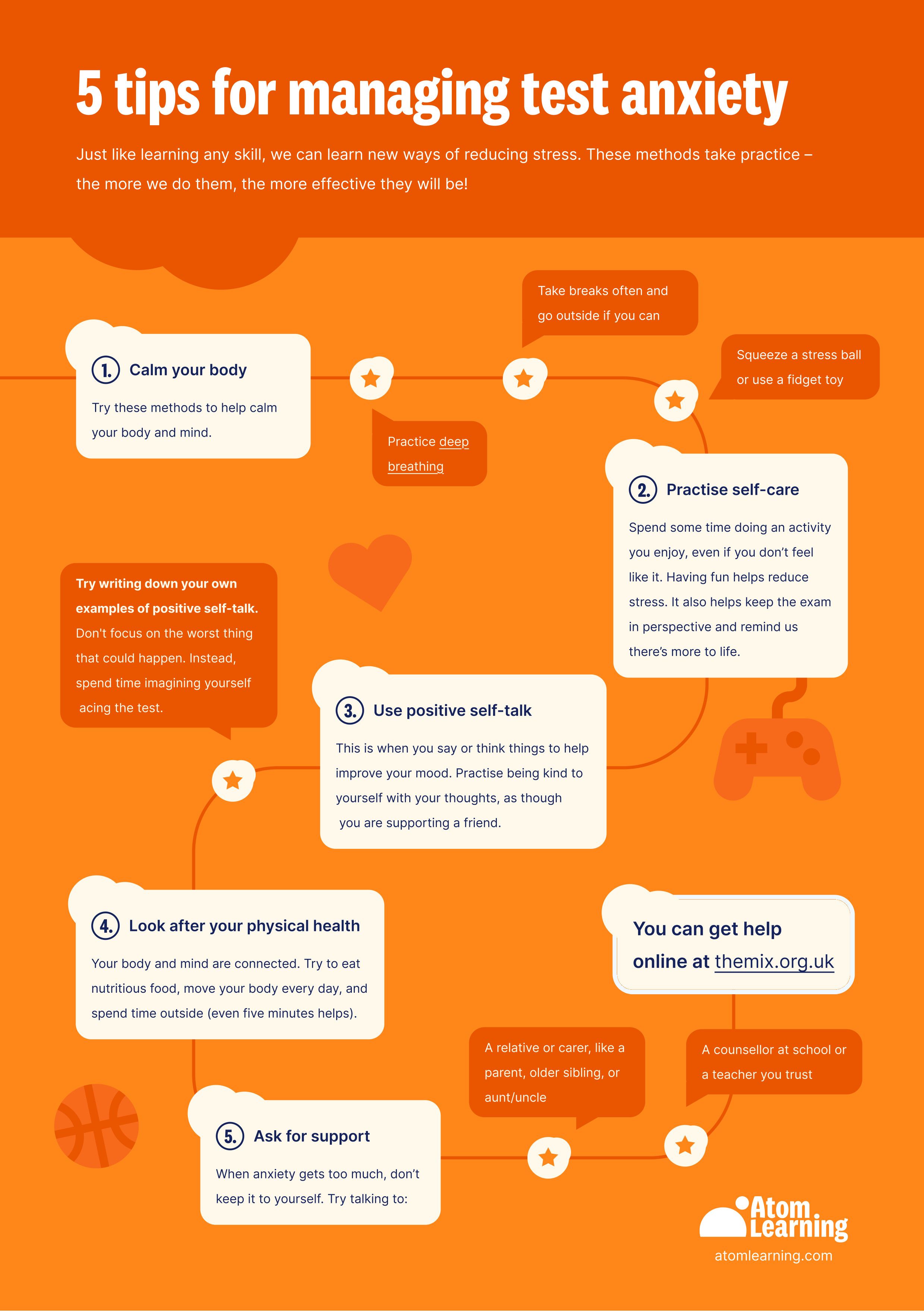Coping with test anxiety: guide for kids

What is test anxiety?
Test anxiety (or exam stress) is the worried feeling when it’s time to take an exam. Anxiety is a normal, human experience. It’s common to feel nervous or scared in a situation where we feel pressured to do a good job. But too much of it can become overwhelming.
The good news is, there’s always something we can do to help manage anxiety and feel calm again!
What does it feel like?
Test anxiety can affect your body, feelings, and thoughts. Here are some things to look out for that suggest you might be experiencing anxiety:
Signs in your body:
- Feeling shaky
- Butterflies in your stomach, or feeling sick
- Headaches
- Sweating
- Fast heartbeat
- Trouble sleeping
- Trouble breathing
- Feeling dizzy
Feelings:
- Angry
- Helpless
- Scared
- Overwhelmed
- Numb
- Tearful
Thoughts:
- “I’m not good enough.”
- “I just know I’m going to fail.”
- “I’m disappointing everyone.”
- “Everyone else is probably acing this test.”
- “If I don’t do well in this exam, something bad will happen.”
You might feel your mind is racing, thinking about times you have made mistakes in the past.
Or you might feel like your mind has gone blank and you can’t remember any of your revision.
Why do we get anxious?
When the outcome of a situation is unknown, our brains sometimes fill the gap with worries. We can focus too much on danger and what could go wrong. This can include negative thoughts about ourselves.
Our brains have evolved to do this as a way of keeping us safe. Thousands of years ago, humans had to be on constant alert to protect themselves from predators.
But in the modern world (when we don’t have to be aware of lions lurking around every corner) this can go into overdrive.
5 tips for managing test anxiety
Just like any skill, we can always learn new ways of managing stress. These methods take practice – the more we do them, the more effective they will be!

1. Calm your body
Use these methods to help calm your body and mind while studying, or if you find yourself worrying about your test:
- Practice deep breathing
- Take regular breaks and go outside if you can
- Squeeze a stress ball or use a fidget toy
When your body relaxes, your mind will follow, and it will become easier to focus.
2. Practise self-care
Spend some time doing an activity you enjoy, even if you don’t feel like it right now. Whether it’s drawing, gaming, sports or singing, having fun helps reduce stress.
It also helps us to keep the exam in perspective and remind us that there’s more to life.
3. Use positive self-talk
Positive self-talk is when you say or think things to help improve your mood. Practise being kind to yourself with your thoughts.
Talk to yourself as though you are trying to support a close friend. Don't focus on the worst thing that could happen. Instead, spend time imagining yourself acing the test.
Here are some things you could think about to help ease your worries:
- “I’ve got this! I’ve studied hard and I know what to do.”
- “I don’t have to get a perfect score, I just have to try my best.”
- “I am struggling with this topic right now, but my test score does not define who I am.”
- “My life outside of exams is important too.”
Try writing down your own examples.
4. Look after your physical health
Your body and mind are connected. Try to eat nutritious food, move your body every day, and spend time outside if you can (even five minutes helps).
5. Ask for support
When anxiety gets too much, don’t keep it to yourself. Try talking to:
- A relative or carer, like a parent, older sibling, or aunt/uncle
- A counsellor at school, or a teacher you trust. They will have spoken with lots of people who have been through this, and your wellbeing is their priority!
You can get help online at The Mix.
In the exam
Before you start, take a few deep breaths to get in the zone. Use your positive self-talk, such as “I can do this!” and “I’m confident.”
Don’t compare yourself to others around you. Keep your eyes focused on your own test. It doesn’t matter if someone else is further ahead than you are.
When you finish a section, take a small break. Give yourself a minute to take a deep breath, and clear your mind before the next section.
Remember to take small sips of water, but not too much or you will need the toilet (which can be very distracting!).
If you get stuck, don’t panic. Take a deep breath and slow down. Read the question again carefully.
After the test
After you finish your exam, try not to spend too much time thinking about how you did. Instead, do something fun and celebrate – you deserve to treat yourself after your hard work!
For more help with test anxiety, visit youngminds.org.uk.
Take control of your child’s 11+ preparation.

Not sure if your child is on track for the grammar school 11+? You don’t need to guess what to cover or whether they’re ready. Atom shows you exactly what to practise each week and how they’re performing, so you can stay ahead of the process without the stress.
- Follow personalised weekly exam plans that show them what to learn next.
- Download replica 11+ practice papers and upload a photo for instant, stress-free marking.
- Track progress and see how they compare to others applying to the same schools.
Start your free trial and help your child feel fully prepared for the 11+.
